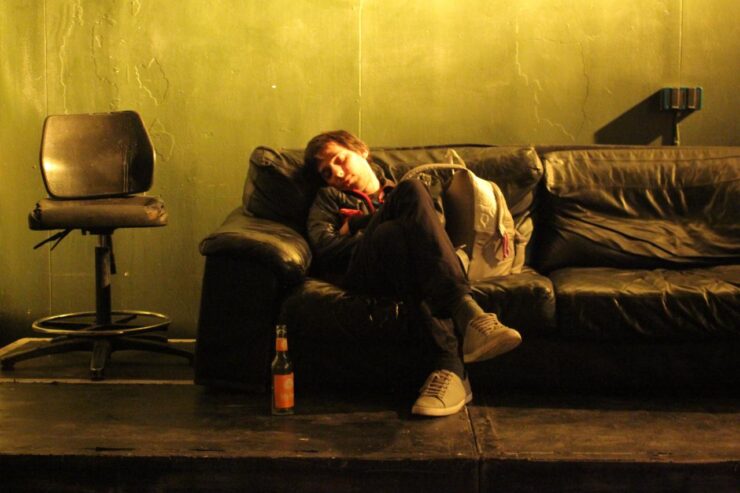News
“Rebuilding: Professions for Professionals and Amateurs Alike” – Jhor van der Horst

Person asleep on a couch in autonomous center OT301 in Amsterdam. Source: DIS-PATCH. Amsterdam. 2011. Photograph, 1024x682px.
“To build is to destroy,” Charlotte Malterre-Barthes remarked at the beginning of her lecture. This echoes Marxist analyses of capitalist creative destruction. Yet, what non-capitalist potential exists for architects? What do architects do if not build? Malterre-Barthes, along with the research and design laboratory RIOT (Research and Innovation On architecture, urban design and Territory) at the Swiss Federal Institute of Technology-EPFL (“RIOT” 2023), attempts to answer this provoking question.
The urgency of the demand — “stop building!”— is clear. Construction is a motor for environmental catastrophe. Entangled in extractive practices, a critical re-imagining of construction’s resource management, labor relations, and social responsibility is due. The research-design based approach of RIOT attempts to unlearn and relearn the many professions surrounding built environments. The “stop” is no call for passivity. It calls for active reflection. By halting new construction and focusing on redevelopment, it might be possible do so. It may be possible to study social, political, and environmental conditions of local sites with ethnographic attention. What life takes place already? This reflection cannot wait.
As chair of housing cooperation SUP, I work in a team on a renovation project of our own. Together with architects, paralegals, civil servants, banks, and other supporters, we aim to realize the transformation of a 3,500m2 flat in Amsterdam. Malterre-Barthes’ words inspire me. Yet, they seem daunting too. While Malterre-Barthes works from within a profession, making assertions like ‘fix the office’ and ‘reform the school,’ we work as outsiders. We are DIYers, amateurs, and engaged citizens. We are making our own home, hopefully with success.
In making our home, we balance our hopeless reliance on an ecology of partners with our practices of self-reliance and autonomy. Notably, peers tell (or warn) us that we are in for a ride. I think of my cousin who, working on a similar project, drives across the Netherlands to pick up salvaged building materials with her pick-up. Building differently takes effort. Self-reliance—a traditional component of autonomist and workerist movements in Amsterdam—informs contemporary housing cooperation praxis. (Savini 2023) In this context, ‘self’-reliance is a commoning strategy focused on maintenance. This strongly aligns with Malterre-Barthes’ appeal for maintenance and non-extractivism.
If building stops, who builds? Who has the incentive to keep going? Who maintains? Currently, housing cooperations face two struggles which I want to highlight. First, labor is often unpaid. This prices people out. Women who perform domestic labor, for example, are underrepresented in cooperations. Second, contractors are hard to come by. Constrained by traditional methods and disincentivized by high profit margins elsewhere, contractors are prone to decline jobs even if they are personally inspired by them. With poignant humor, Malterre-Barthes calls for new professions like “brick cartographer,” “cleaner executive officer (CEO),” and “home arachnologist” (Dzierżawska and Malterre-Barthes 2021). My wish is that Malterre-Barthes’ provocation creates professions for both amateurs and professionals, so that more people are able to join both autonomous cooperations and in ecologies of partners.
References
Dzierżawska, Zosia, and Charlotte Malterre-Barthes. Architecture without Extraction. 2021. Comic, 5 pages.
“RIOT.” 2023. Riot.Today. 2023. https://riot.today/.
Savini, Federico. 2023. “Maintaining Autonomy: Urban Degrowth and the Commoning of Housing.” Urban Studies 60 (7): 1231–48. https://doi.org/10.1177/00420980221121517.

